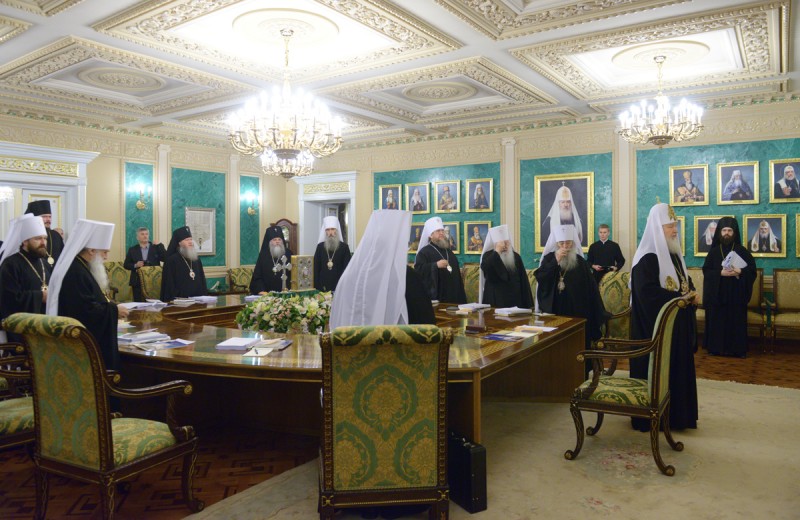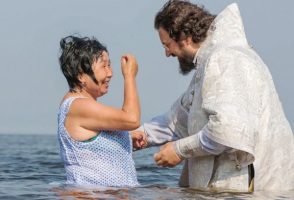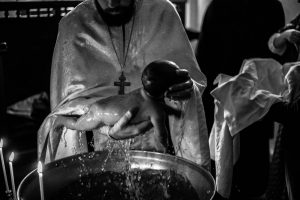The following document was adopted at a meeting of the Holy Synod of the Russian Orthodox Church on December 25-26, 2013 (journal No. 158).

+++
At the present time, the reproductive biomedical technology that has received the name “surrogate motherhood” has become increasingly widespread. While several countries permit this practice by law, it continues to provoke heated debate in society. The “The Basis of the Social Concept of the Russian Orthodox Church,” adopted by the Jubilee Bishops Council in 2000, assessed this phenomenon. However, a whole series of questions regarding the pastoral relationship towards the consequences of “surrogate motherhood” continues to raise discussion. The present document of the Russian Orthodox Church gives ecclesial-practical guidance concerning the Baptism of children born with the help of a “surrogate mother.”
The Church regards marriage as a primordial establishment of God, rooted in God-created human nature. In the Christian understanding, marriage is a spiritual and physical union of man and woman allowing them to realize the fullness of their human nature.
The Church sanctifies marriage, likening it to the spiritual union of Christ and His Church (Ephesians 5:22-33). The fruit of conjugal love are children, whose “birth and upbringing belong, according to the Orthodox teaching, to one of the most important goals of marriage” (BSC X.4).
The birth of a child is not only the natural consequence of marital relations, but also the great event of the coming into the world of a new human person, bearing the image and likeness of God the Creator. By giving birth to children, a husband and wife take upon themselves a grave responsibility, inasmuch as they are called to exercise the utmost care simultaneously for their physical and spiritual health: from the period of gestation and the first days of life until the coming of age.
A special role in the birth and upbringing of children belongs to the mother, who is closely bound to her child by ties of body, soul, and spirit. The Church sees a great example of motherhood in the Most Holy Theotokos, whose image reveals the supreme worthiness of woman and the uniqueness of her maternal vocation.
A serious problem that families frequently face is that of the infertility of one or another spouse. The Church sympathizes with childless spouses, blessing them to pray for the gift of offspring, to seek medical treatment for infertility, as well as to adopt children.
The Church considers the exclusive permissible means of medical care for childless spouses to be the artificial insemination of a husband’s germ cells, if not accompanied by the destruction of fertilized eggs, “since it does not violate the integrity of the marital union and does not differ basically from natural conception and takes place in the context of marital relations” (BSC XII.4).
As far as the practice of so-called “surrogate motherhood” is concerned, it is denounced by the Church: “‘Surrogate motherhood,’ that is, the bearing of a fertilized ovule by a woman who after the deliver returns the child to the ‘customers,’ is unnatural and morally inadmissible even in those cases where it is realized on a non-commercial basis” (BSC XII.4).
The very term “surrogate motherhood” indicates a distortion of the higher understanding of maternal duty and vocation. The relevant practice humiliates of the human dignity of women, whose body in such cases is seen as a kind of incubator.
Moreover, the practice of “surrogate motherhood” destroys the full natural relationship between mother and child and has negative consequences for all parties involved in the practice: for the “biological mother,” who has given her germ cells, but who is deprived of the fullness of motherhood connected with the pregnancy and birth of this child; for the “surrogate mother,” who has borne and given birth to the child, but is forced to leave it as soon as it is separated from the mother’s womb; for the child itself, who instead of having a full-fledged mother has either two inferior mothers, or has none (as is the case of a single male who desires to have “biological offspring”); and finally, for society, in which the understanding of family that suggests a special relationship between parents and children – and the no-less-important generational relationships between grandparents and grandchildren – is lost.
The societal danger of the practice of “surrogate motherhood” is connected with a radical change in the very notion of human nature. In the given case, the understanding of the human person as a unique individual is replaced by the image of the human person as a biological specimen that can be arbitrarily designed by manipulating elements of the “genetic material.” “There is a growing attitude to life as a product which can be chosen according to one’s own inclinations and which can be disposed of along with material goods” (BSC XII.4).
The use of reproductive technologies with the goal of “guaranteeing children” to infertile couples and single men or women is gradually turning into a profitable business that provides a way to earn money for donor gametes and “surrogate mothers.” As a result, the sacrament of the birth of a human person becomes the subject of trade and monetary relations.
The Church is open to all people seeking salvation. Baptism is the sacrament of entry into the Church and implies the acceptance of the one receiving Baptism with its faith and teaching, as well as their continued participation in church life.
The sacrament of Baptism is performed in the Orthodox Church over both adults and infants. Adults are admitted to the sacrament after appropriate preparation, that is, by the catechumenate – instruction in Christian doctrine and Christian morality. In such cases, the decision of when to adopt Baptism is taken by the parish priest who has conducted the instruction.
In the case of the Baptism of an infant, consent is given for it by adults: parents and sponsors. The conditions for Baptism of an infant are thus its upbringing in the Christian faith and in accord with the norms of Christian morality, which involves the regular participation of both parents, child, and sponsors in the Church’s services and sacraments.
In the case of the possibility of baptizing infants born to a “surrogate mother,” the following factors must be taken into consideration.
On the one hand, any infant who has been born can be Baptized – in accordance with the faith of those who intend to Baptize it. The child cannot be responsible for the actions of its parents and is not to blame if his birth is connected with reproductive technology condemned by the Church.
On the other hand, the responsibility for the Christian upbringing of a child is borne by the parents and sponsors. If the parents do not bear explicit repentance for their deed, and the sponsors in fact concur with the sinful act that has been performed, then there can be no talk of a Christian upbringing. Refusal to Baptize an infant in such cases will correspond to the Orthodox tradition, which assumes the agreement of the Baptized – and, in the case of infant Baptism, of its parents and sponsors – with the teachings of the Church. Such refusal will also have pastoral significance, inasmuch as society will thereby receive a clear signal from the Church that the practice of “surrogate motherhood” is unacceptable from the Christian point of view.
A child born with the assistance of “surrogate motherhood” can be Baptized according to the wishes of the party that will be raising it, if such are either its “biological parents” or its “surrogate mother,” only after they have recognized that, from the Christian point of view, such reproductive technology is morally reprehensible and have borne ecclesial repentance – regardless of whither they ignored the Church’s position consciously or unconsciously. Only in this case can the Church expect that the Baptized child will be brought up in the Orthodox faith and that Christian moral concepts will be instilled in it. If such recognition does not occur, then the question of Baptism is deferred until the child can make a conscious personal choice of its own. In the latter case, the fact of “surrogate birth” in and of itself is not an obstacle for one’s Baptism, since one is not responsible for the behavior of one’s parents.
In the case when an infant is brought to Church who has been born of a “surrogate mother,” the question of its Baptism can be decided in accordance with the instructions of the diocesan bishop, who is bound to be guided in concrete cases by the norms contained in the present document. The performance by a priest of the sacrament of Baptism in such cases without the blessing of his bishop serves as the basis for applying canonical sanctions to this priest.
In cases of mortal danger, it is blessed to Baptize infants regardless of the circumstances of their birth.
The position stated is based on the teachings of the Church regarding the inadmissibility of the Baptism of infants in families whose members explicitly and deliberately neglect ecclesial tradition and do not share the Christian teaching about marriage and family, which practically eliminates the possibility of the child’s Christian upbringing. This concerns not only the question of “surrogate motherhood,” but also any consciously expressed unwillingness to live in a Christian manner.
Translated from the Russian



















